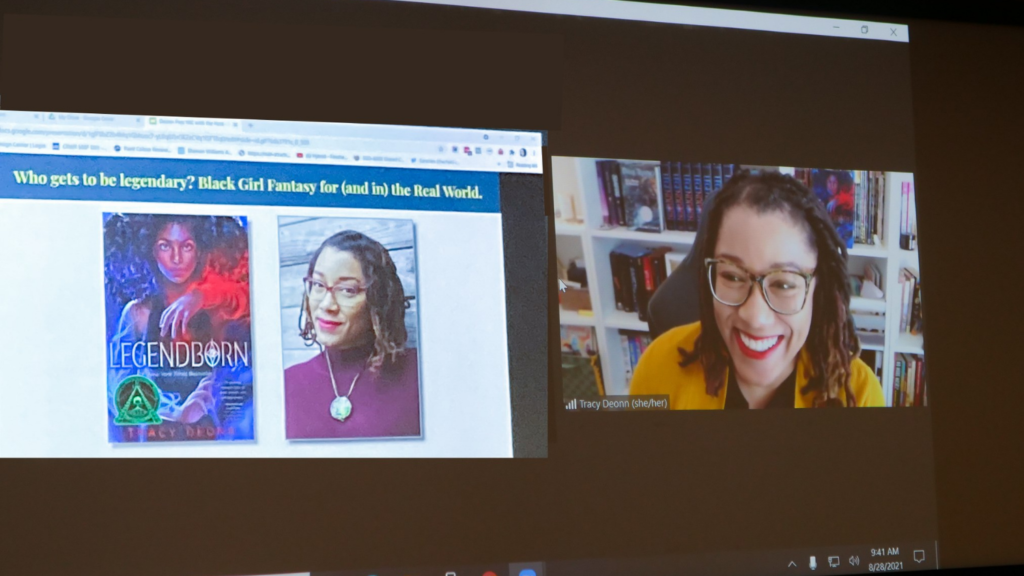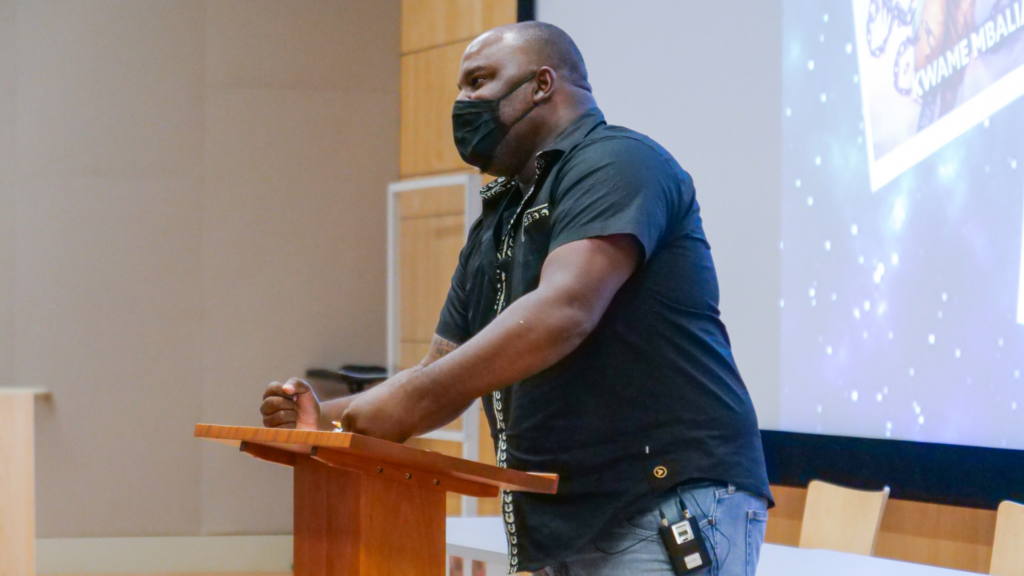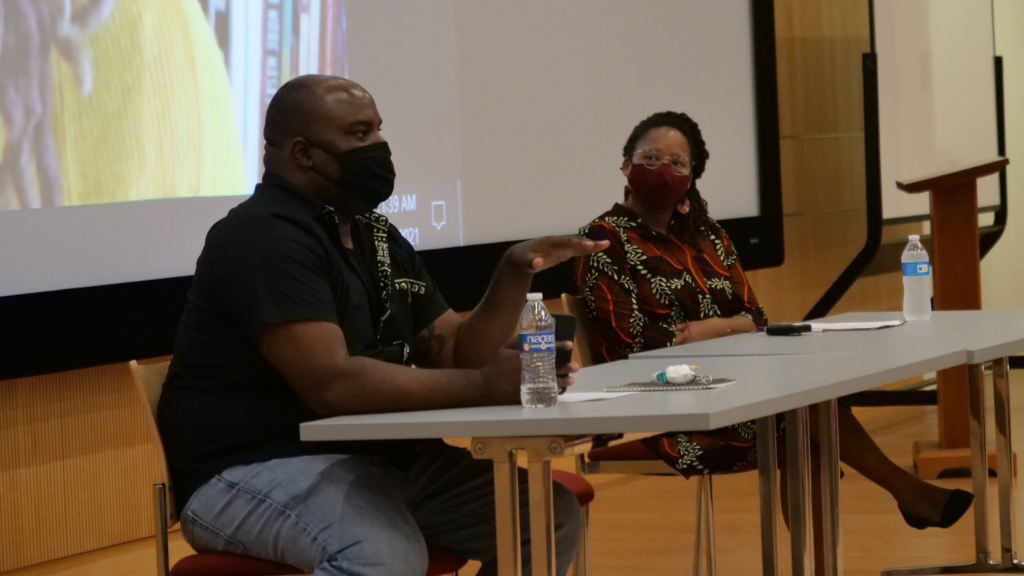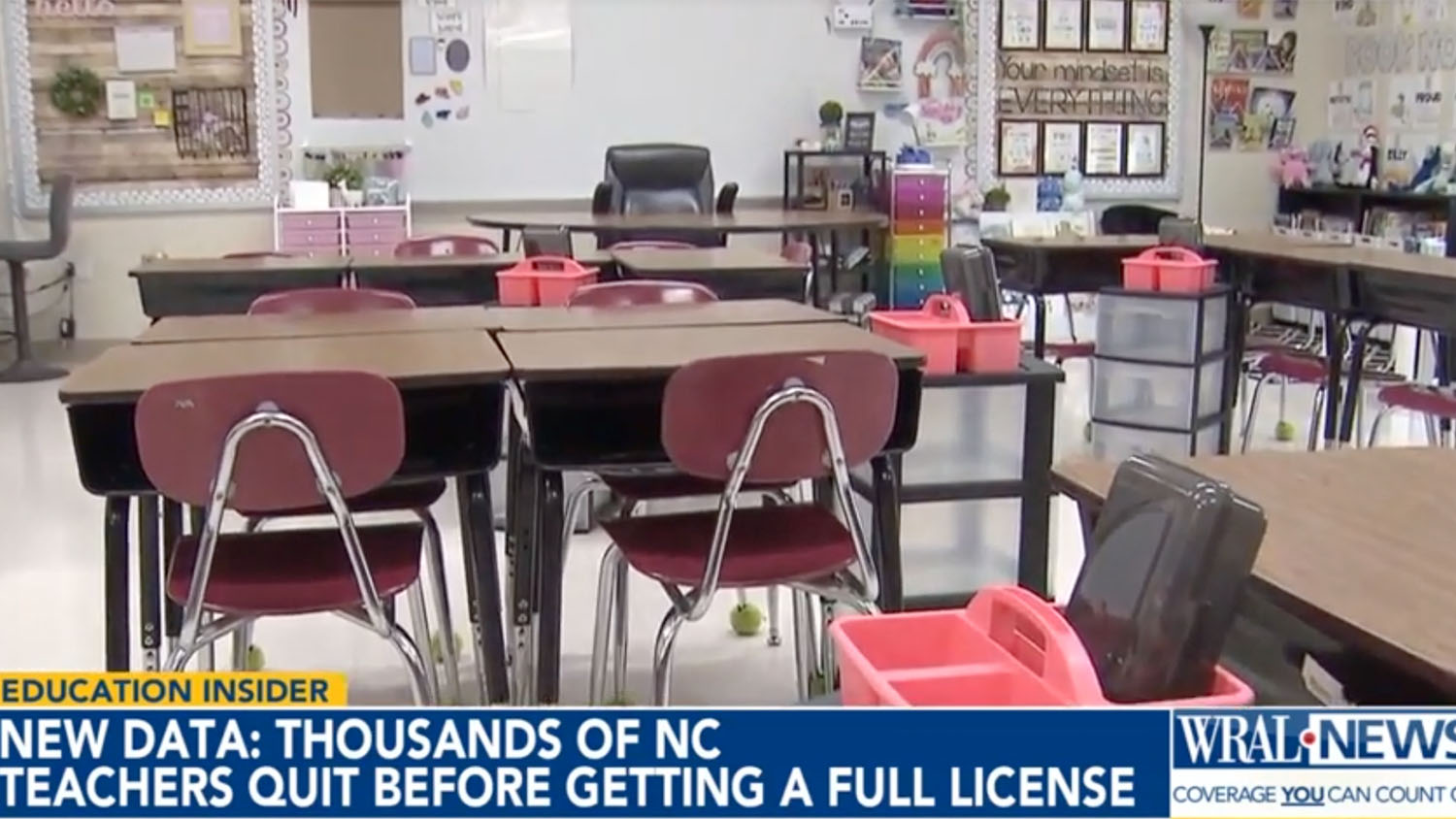Best-selling Authors Tracy Deonn, Kwame Mbalia Celebrate Magic of Black Characters at Young Adult Colloquium

Who gets to go on fantastical adventures? When fictional characters travel to Mordor or become part of The Neverending Story, what experiences do they bring with them and who do they look like?
These are questions that matter deeply to best-selling Black authors Tracy Deonn and Kwame Mbalia, the keynote speakers at the NC State College of Education’s 2021 Young Adult Colloquium: Come YAC with the Pack.
Deonn is a self-described fangirl who is so attached to The Neverending Story she has the Auryn tattooed on her back. Mbalia grew up with a love for Star Trek: The Next Generation, especially the character Geordi La Forge, portrayed by Lavar Burton. But both Deonn and Mbalia realized something was missing from the fantastical stories they loved so much.
“As a tiny uniform-wearing, glasses-wearing black nerd, I gravitated to Geordi,” said Mbalia. “While it was great and refreshing, it also begged the question, why is it only Geordi?”
Black characters were few and far between in speculative fiction when Mbalia and Deonn were young, and the dearth of Black characters in children’s books is an issue that remains to this day.
“There are more children’s books about animals than people who look like me,” Mbalia said.
The theme of the 2021 Young Adult Colloquium was “Celebrating the Magic of Black Characters,” and both Deonn, author of Legendborn, and Mbalia, author of the Tristan Strong series, created their own Black characters to help fill the void they felt growing up.
“That feeling of being caught up in something fantastic is something that all Black children should be able to have,” Deonn said.
At the colloquium, Deonn and Mbalia delivered keynote speeches about why it matters for Black students to see themselves represented in speculative fiction and what it means for Black characters to go on fantastic journeys of their own.
Whose Lives and Losses Become Legendary?
When Tracy Deonn’s mother passed away, Deonn was left with not only grief but also an intense curiosity about her family history and lineage.
“Like academic research, the best stories begin with questions that have no easy answers,” Deonn explained.
But answers about her ancestry only went so far back, until she reached what she called the wall of enslavement, before which information about her family simply did not exist. For Deonn, running into that wall became the spark that led to Legendborn.
“Whose lives and losses get forgotten and go unexplained and whose lives and losses become legendary?” Deonn asked.

She drew on her love of Arthurian legend and her experiences growing up as a Black girl in central North Carolina to create Bree, a teenager whose anger and questions about losing her mother lead her to infiltrate a secret, magical society at UNC-Chapel Hill with ties to the Knights of the Roundtable.
“I needed a story at that point in my life, and I imagined a teenage girl, a black girl, who could answer an impossible question,” Deonn said.
While the world Deonn created is fantastical, Bree’s experiences as a Black teenage girl are grounded in reality. In addition to fending off magical attacks, Bree must also navigate the realities of racism. For Deonn, the key was not leaving Bree’s Blackness at the door.
“There’s a need that’s being met in projects like this and others in seeing yourself reflected as layered, as complicated, as someone who’s allowed to be vulnerable and strong and hold grief and joy, sometimes at the same time, and then have all these adventures in concert with their blackness,” Deonn said.
Leaving Roots Beneath the Surface
While Kwame Mbalia loves the sword and sorcery genre—his favorites growing up included The Lord of the Rings, Conan the Barbarian and The Wheel of Time—he became frustrated by the genre’s reliance on the western canon of fantasy literature.
“We can love something and criticize it as well,” Mbalia said.

He’d spent his whole life reading about knights, kings, squires and pages. Mbalia wanted to know: Where were the Mamluks? Where were the tribal chieftains of old Zimbabwe?
In his best-selling Tristan Strong series, Mbalia answers these questions by populating his book with African gods, like Anansi, and African American folk heroes, like John Henry, in a story that centers around a Black teen named Tristan.
Mbalia lost his father six months before he started writing Tristan Strong Punches a Hole in the Sky, and like Bree in Legendborn, Tristan’s story is touched by grief. His best friend dies in a bus crash, which eventually sparks Tristan’s journey into a fantasy world where the legacy of the slave trade and the folk tales he grew up on become surprisingly real.
“At the core of the trilogy is this idea of collecting stories that were forgotten or that were passed down that Tristan begins to find out have a greater influence on him and his life,” Mbalia said.
It’s important for Mbalia that his readers know about the existence of these types of stories.
“There are so many other stories out there that we have not been exposed to. Not because you want to read it. Not because you don’t want to watch it,” Mbalia said. “But because you don’t know it exists.”
Mbalia hopes this addition to the sword and sorcery genre, a story based not on kings and queens but instead on the African and African-American experience, will inspire his young readers to discover more about their own history.
“When I write, I don’t want to lecture, I don’t want to beat you over the head with history,” Mbalia said. “What I want to do, specifically for our younger readers, is to plant those seeds, to leave those little bits of roots under the surface.”
Reclaiming Spaces for Black Stories
When Jewel Davis, an education librarian and associate professor in the Instructional Materials Center of Appalachian State University’s Belk Library and Information Commons, joined Mbalia and Deonn for a panel discussion following their keynotes, she drew attention to a theme she felt their work had in common.
“Both of these stories are about reclamation,” said Davis. “Reclaiming spaces for our stories. Reclaiming spaces for our contributions to history, the stories of our heroes and our ancestors, who are legends to us.”

Davis was also a member of the juries that chose to award both Deonn and Mbalia with Coretta Scott King Book Awards.
“It’s a huge win and triumph for the genre,” said Deonn. “It’s a huge win and triumph for Black American fantasy because Black American fantasy has been so pivotal.”
For Mbalia, whose parents searched high and low to purchase books written by Black authors, winning the Coretta Scott King Book Award was deeply meaningful.
“I wanted nothing more than to show my father that I could put my book on that shelf, next to Roll of Thunder, Hear My Cry or Slam by Walter Dean Myers, next to all the books my family provided for me so I could learn about who I was, who we were and who we could be.”
That idea of who we could be, of transcending, is an idea that speaks deeply to both Mbalia and Deonn. They both believe in the validity and power of stories about Black trauma, but for each of them, there is also a desire to write stories that can transcend that trauma and become something magical.
“I wanted to feel triumph and hope but not always mired in a history that made me feel sad or limited,” said Deonn. “I think there’s an arc we can chart — Tristan’s a part of this arc — of how ELA is recognizing Black stories, and I’m really glad that Kwame and I are moving in a direction where we can talk about magic and blackness in the same breath.”
As part of that movement, Mbalia was the editor of Black Boy Joy, a middle-grade anthology published in August that celebrates the magic of black boyhood.
“The first week, I was in tears for seven days straight because people kept DMing me pictures of their sons, their nephews, cousins, neighbors holding pictures of the book and just smiling, carefree,” Mbalia said. “And for such a long time those stories have not been the ones told about the boys who look like that on the cover.”
Davis described Mbalia and Deonn’s celebration of the magic of Black characters as an opportunity to reclaim those stories of what it means to be Black in America.
“It’s saying we’ve always been here,” said Davis. “We have been in your histories. We’ve been in your canons. We have been in your stories, so see us.”
Through that reclamation, Deonn and Mbalia hope to inspire that same magical feeling they experienced growing up.
“I just want that for black characters so much,” said Mbalia. “I want Tristan and Bree to like, be in the same afterschool program and blow some little kid’s mind.”
- Categories:


